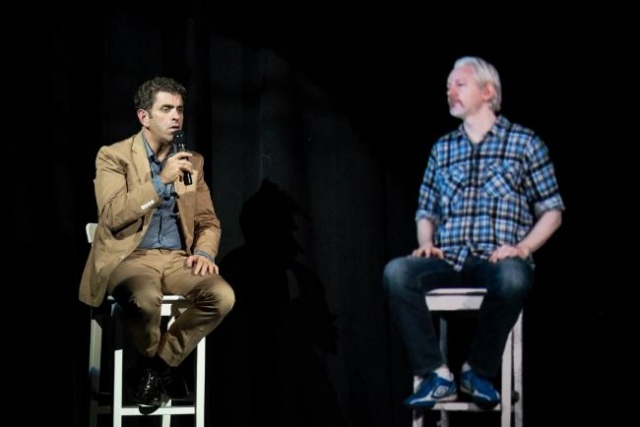
Julian Assange appears in the United States live onstage – as a hologram
WikiLeaks co-founder Julian Assange left the Ecuadorean Embassy in London on Sunday — sort of.
Assange, who has been living in asylum for more than two years, appeared onstage in Nantucket, Massachusetts, as a hologram, participating in a live interview at the Nantucket Project’s Art + Commerce summit. Assange was interviewed by filmmaker Eugene Jarecki, who was present in Nantucket.
“I’m getting very good at secret communication,” Assange, seated on a stool and beamed from inside the the embassy, said of living as a fugitive in plain sight.
His appearance as a 3D, life-size, high-definition projection was produced by Hologram USA, the same company behind the holograms of Michael Jackson and Tupac Shakur.
Assange expressed anger at his forced asylum.
“I’m very pissed off,” he said. “About the torture of Chelsea Manning, the banking blockades against me, the effect on my family and staff. But being really, really pissed off — you can use that as a fuel — to help you keep going and to see a situation clearly.” He also reiterated his recent criticism of search giant Google. “Google is not ‘a playroom of ideas’ as it wants to portray itself, and it’s not a ‘different kind of company,'” Assange said. “It’s a normal company. Unlike normal companies it is engaged in a very ambitious project that is not normal … to gather as much info as possible on people, store it, index it and use it to sell advertising. And it’s very easy for the NSA to get its fangs into that. “Google should be broken up,” Assange added. “If it were the 1970s it would be broken up. It’s far more powerful than AT&T was.” Assange was granted asylum by Ecuador’s foreign minister in 2012 to avoid extradition to Sweden, where he is wanted for questioning in cases of alleged rape and sexual molestation. Assange claims the charges are part of an international smear campaign stemming from WikiLeaks’ publication of diplomatic cables.


